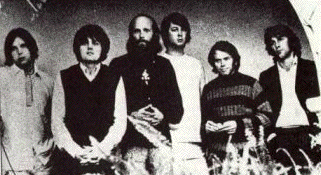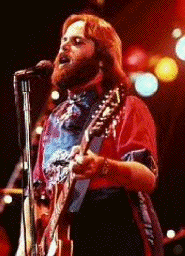This article originally appeared in Time magazine, Sept. 6, 1971. The author is not listed.
There was a time in the stone
age before the Beatles, as Pop Critic Richard Goldstein once put
it, when everybody under 20 seemed to be searching for the "perfect
wave." Along with hot-rods and sports cars, surfboards had
become both means and metaphor for the new, rootless mobility
of the American young.  In
Southern California especially, sunning, surfing, chasing chicks,
gobbling Cha-Cha burgers, even watching TV became life values
worth celebrating.
In
Southern California especially, sunning, surfing, chasing chicks,
gobbling Cha-Cha burgers, even watching TV became life values
worth celebrating.
No pop group celebrated those slender but seductive values more lovingly than the Beach Boys. Theirs was a soft, euphonious music - intricate, warm layers of bell-like harmonies over calm, steady rock beats, all of it intended to evoke the rhythm of the ocean. When it came to the message, the Boys never let content interfere with contentment. "You can always write about social causes, but who gives a damn?" No. 1 Beach Boy Brian Wilson asked at the time. "I like to write about something these kids feel is their whole world." In song after song - "Little Deuce Coupe," "Car Crazy Cutie," "Girls On The Beach," and, naturally, "Fun Fun Fun" - Wilson and his sidemen did just that. By the mid-1960s the Beach Boys were the most popular U.S. rock group in history.
Time and fame pass quickly in
the pop world - for everyone, it would seem, except the Beach
Boys. One decade, 23 LPs and 20 million record sales after they
racked up a hit ("Surfin'") on their first try, the
Beach Boys appear to be cresting on a new wave of popularity.
It is due partly to the same nostalgia kick that has given so
many other rock "oldtimers" new commercial success.
But the Boys' floating style also fits right in with the softening
of rock's hard core that has brought  composer-singers
like Elton John and James Taylor to the fore. The Beach Boys themselves
have matured considerably. Brian is now 29, brothers Dennis and
Carl 27 and 25 respectively, Al Jardine 27, Bruce Johnston 27,
and Mike Love 30. As men they have more to say (all those beaches
are dirty, for one thing), and they do not mind at all if adults
listen.
composer-singers
like Elton John and James Taylor to the fore. The Beach Boys themselves
have matured considerably. Brian is now 29, brothers Dennis and
Carl 27 and 25 respectively, Al Jardine 27, Bruce Johnston 27,
and Mike Love 30. As men they have more to say (all those beaches
are dirty, for one thing), and they do not mind at all if adults
listen.
Pop Polish. The group's latest LP, Surf's Up (Brother/Reprise), released last week, is a case in point. Always noted for their pop polish, they have this time turned out one of the most imaginatively produced LPs since last fall's All Things Must Pass by George Harrison and Phil Spector. Al and Mike's "Don't Go Near The Water" is probably the best song yet to emerge from rock's current ecology kick. Against a satirical background provided by a gurgling Moog synthesizer and a tickling, Satie-like piano, come the words:
Toothpaste and soap will make our oceans a bubble bath So let's avoid an ecological aftermath Beginning with me Beginning with you Don't go near the water...
"Student Demonstration Time" is a hard-rock parody that ponders the wisdom of violence:
I know we're all fed up with useless wars and racial strife But next time there's a riot, well, you best stay out of sight...
The title song, "Surf's Up," finds Brian as close as he probably will ever come to something he has long searched for: a floating, ethereal tone painting that he modestly describes as "the sound of heaven."
A potential hit, "Surf's Up" is also a song that documents the kind of personal dilemma that can afflict a rock star if he is not careful. Beginning in 1965, Brian could no longer find any satisfaction in sunny days, surfing and driving. He seemed to his friends to be lost and shattered, obviously convinced that the world was too much to cope with. Accordingly, Brian quit public life. Though he continued to make recordings (including the cleverly innovative Pet Sounds), he sometimes would not come out of his Bel Air house for six months at a stretch. Among other things, he erected a tent that filled his living room (for top-secret Beach Boy pow-wows), and covered the floor of his dining room with a huge sandbox.
In was in that sandbox, back in
1966, that he first wrote "Surf's Up" in collaboration
with Van Dyke Parks (Song Cycle). Though "Surf's Up"
was  programmed by Leonard
Bernstein on a TV special, Brian soured on the song. It was never
commercially recorded, and, so the story went, Brian suppressed
all taped copies. Last spring, after a four-year interval, a tape
turned up in the Beach Boys' vault. Brian liked it again. "I
have to admit, it's not bad," he said. And he recorded it
for the new album.
programmed by Leonard
Bernstein on a TV special, Brian soured on the song. It was never
commercially recorded, and, so the story went, Brian suppressed
all taped copies. Last spring, after a four-year interval, a tape
turned up in the Beach Boys' vault. Brian liked it again. "I
have to admit, it's not bad," he said. And he recorded it
for the new album.
Virile Sound. The essential message of Surf's Up - a celebration of the return to childhood - may exasperate mature listeners but seems to have worked wonders for gloomy Brian. His music has a high, soaring, quasi-religious vocal and instrumental character that even the Beatles of Abbey Road could envy. At long last, he may be on the verge of coming out of his house. Brother Carl reports that Brian has pledged to appear at a Beach Boys concert in Manhattan's Carnegie Hall this month.
That may take some doing. One afternoon last week, Time correspondent Timothy Tyler was invited out to the Wilson house for what was promised to be Brian's first interview in four years. Brian never came downstairs. "The meeting was a test for him," reports Tyler. "He thought he could do it, but he failed." Brian did manage to phone down to Tyler as he sat in the backyard with Carl. "I'm sorry I couldn't make it down, but I just got to sleep," Brian explained. "Let me talk a while on the phone before I drift off again... What'm I doing? Getting back into arranging, doing that more than writing now... I'm really exited "Surf's Up" - as a single - it has a very virile sound... Well... um... I'm drifting off again... " Click. Whatever Brian does, Surf's Up is doing well enough. Barely out, it is fast approaching $250,000 in sales.